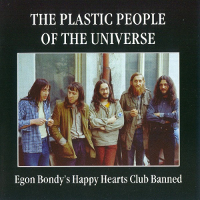| Review by fausto K January 18, 2015 (5 of 5 found this review helpful)
|
Performance:  Sonics: Sonics:  |
I'm sure this is one of the most outré albums issued on SACD, at least it is the most underground SACD I have in possession. The Czech branch of EMI should be applauded for issuing this disc of relatively obscure music at all (although in the Czech Republic, it probably isn't that obscure, certainly not to a certain generation raised during the Communist years).
The Plastic People of the Universe (PPU) were a Czechoslovakian band started towards the end of the 60s and dedicated to live renditions of Western rock (the Fugs, Velvet Underground) and were heavily unfluenced by the Mothers of Invention and Captain Beefheart. Some 10 years ago, Globus Music documented all their live recordings on a set of CDs, including the early period. Although PPU were foremost musically interested, it was of course unavoidable in the Communist era that they became embroiled in politics, if perhaps unwillingly. They were an highly intellectual band, associated with art critic Ivan Jirous, and very much inspired by Czechoslovakian cinema and literature (hence the lyrics by, among others, dissident poet Egon Bondy). They played at Vaclav Havel's country house in 1977. Earlier, in 1976, the group were among 27 people who were arrested and imprisoned for "openly defying the state" at a festival. The public outrage that ensued led to the famous Charter 77, Havel being one of its famous signatories. Quite different from the concurrent hedonistic lifestyles of 70s acts Led Zeppelin or the Rolling Stones, say!
The music is often compared to Frank Zappa and the Velvet Underground. But by the time of the first studio effort, i.e. the album under review here, recorded in 1974, apart from the violin parts that remind one of the early VU (pre-John Cale-exit), these influences appear to have largely whittled away. On "Egon Bondy's...", one can still hear the fuzz-guitar that is reminiscent of 60s garage rock on a track such as 'Toxika', but overall one hears more a kind of unhinged Krautrock cum free jazz-stylings, combined with unruly Bohemian folk flourishes (check those chanted vocals/snoring parts on track 10: 'Jó-to se ti to spí'). The demented free-jazz boils over on track 'Zácpa', with its Albert Ayler-style overdriven rasping sax solos. Ultra-repetitive tracks 'Magické noci' and 'Podivuhodny mandarin' are infectiously hypnotising and without equal, best comparable to an even more freakish Can (esp. the early Can of Can: Delay 1968, Can: Soundtracks, Can: Monster Movie) and clearly point forward to The Fall, the UK purveyors of menacing repetition & sharp-witted idiocy par excellence (I'm wondering whether M.E. Smith might have actually heard PPU back in the day, although PPU music was hardly widely available outside Czechoslovakia).
Let's not kid ourselves, the sound on this SACD is not bad, but it betrays its primitive analogue source. The sound is sometimes too distorted in a non-musical way and there is often a harshness in the highs -- to be clear, this is not the functional distortion inherent to the music, but rather due to the limitations of the recording (this is the Eastern bloc, circa 1974, after all). Having said that, the soundstage is remarkably wide, with clear separation of instruments, far better than heard on the redbook version of a couple of tracks from this album on a compilation of underground Czech music I bought some 10 years ago in a Prague record shop. Compared to redbooks of comparably abrasive music from the 70s, the sound is rather good, but compared to what SACD is capable of, it's definitely substandard. It's probably the most one could hope for, given the source tapes.
Notice that the text in the booklet is all in Czech.
|
Was this review helpful to you?
yes |
no
|
|

